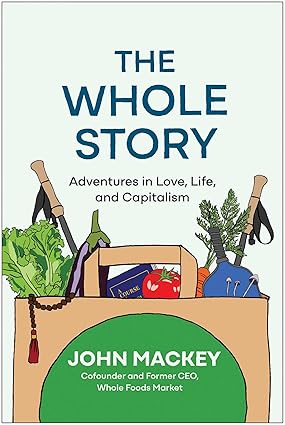
A checkout from Portsmouth (NH) Public Library. Appropriate, because Portsmouth is the only New Hampshire town with a Whole Foods Market. I picked it up based on the recent mini-review from Katherine Mangu-Ward in Reason.
As KMW notes, this is a mashup of "a business book, a spiritual journey, and a personal journal." John tells his story of starting his first "natural food" store with his then-girlfriend out of a Victorian house in Austin, Texas. (Dubbed "Safer Way", get it?) And, oh so gradually, developing the chain of Whole Foods Markets that grew and thrived under his leadership. His personality is an interesting mix of far-out hippie and button-down no-nonsense libertarian capitalist.
He discusses his admiration for Friedrich Hayek and Milton Friedman early on, and touches on his attitude toward free markets and voluntary exchange throughout. (He says "win-win-win" a lot.) Occasionally this led to conflict. For example, he refers to his 2009 WSJ op-ed on healthcare policy, on which the editors attached a headline more partisan than he would have preferred: The Whole Foods Alternative to ObamaCare. It also featured Margaret Thatcher's classic quote: "The problem with socialism is that eventually you run out of other people's money." (Back in 2009, I blogged about the op-ed and the resulting controversy quite a bit, for example here, here, here, and here.)
John also writes of his opposition to unionization efforts, another thorn in the side of his largely-progressive customer base. He was largely successful in denying the unions. ( The United Food and Commercial Workers International Union was successful in unionizing one (1) store in Philadelphia earlier this year, long after John left the company.) And there were conflicts with regulators, pretty bogus in his telling: the SEC, the FTC, even local "weights and measures" bureaucrats.
There's also a lot of discussion of John's efforts to keep Whole Foods aligned with his vision, navigating the stormy waters of the biz: venture capitalists, IPOs, activist investors, fractious board members, and so on. It all culminates with Whole Foods selling out to Amazon in 2017, which eventually leads to John's decision to part ways with his baby.
There are a lot of good yarns along the way. One early-days supplier of hand-wrapped baked goods to the first Whole Foods store was quite popular, until one new employee declares during a taste test: "This is a Sara Lee muffin!" And a surprise visit to the supplier's "bakery" discovers, yup, a "pile of empty Sara Lee boxes".
The hippie side is well-represented too. John's pretty fond of psychedelics: MDMA, psilocybin, LSD. (Although he says there was a 25-year period where he didn't take them in a "significant" amount.) He's into meditation and breathing, etc. Hey, whatever gets you through, man.
A final interesting (to me) note: John notes the dichotomy between "foodies" (his term) and "health nuts" (my term). He's the latter, and at some point he goes full vegan, but he's aware that Whole Foods had appeal to both factions. So Whole Foods sold "animal products" (meat, dairy), although John did not buy them.
So other than John's paean to his favorite smoothie recipe, there's not a lot here about really enjoying food.
![[The Blogger]](/ps/images/barred.jpg)



